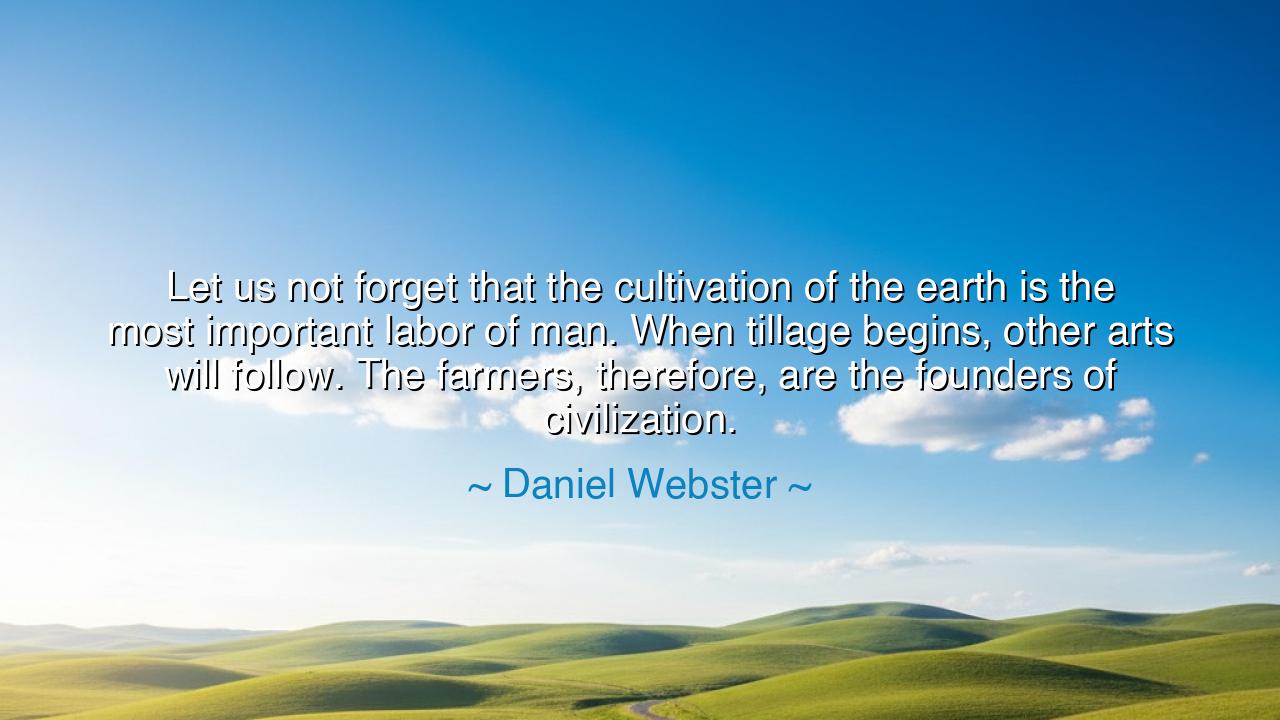
Let us not forget that the cultivation of the earth is the most
Let us not forget that the cultivation of the earth is the most important labor of man. When tillage begins, other arts will follow. The farmers, therefore, are the founders of civilization.






Hear the noble words of Daniel Webster, statesman, orator, and guardian of the American spirit, who proclaimed: “Let us not forget that the cultivation of the earth is the most important labor of man. When tillage begins, other arts will follow. The farmers, therefore, are the founders of civilization.” In these words lies not merely praise for agriculture, but reverence for the very foundation of human progress — the sacred bond between humankind and the soil. For before there were kings, temples, or poets, there were hands that broke the ground, sowed the seed, and drew from the earth its first fruits. All that came after — law, art, philosophy, and nation — rose from that primal labor.
Daniel Webster, who lived in the early nineteenth century, was a man of great intellect and patriotism. He saw his young nation growing powerful, industrial, and ambitious, yet he warned against forgetting the humble roots from which all greatness springs. To cultivate the earth is not simply to grow food; it is to establish order, to nurture life, and to form the rhythm upon which civilization depends. The plow was humankind’s first tool of peace, the mark of settlement and stewardship. When men ceased wandering and began to till the ground, they also began to build — to build homes, to build communities, to build the very structure of human society.
Tillage, then, was the dawn of all art and industry. It taught discipline, patience, and foresight — virtues upon which every craft is built. The farmer watches the seasons, studies the sky, and learns to wait upon nature’s timing. From him the builder learned the value of foundation; from him the craftsman learned to shape material with care; from him the poet learned to see divine beauty in humble things. Every great work of civilization — from the Pyramids of Egypt to the cathedrals of Europe — stands upon the principle first taught by the field: that creation demands both labor and reverence.
History bears witness to Webster’s truth. Consider Cincinnatus, the Roman farmer who left his plow to save his country in war, only to return to his fields when victory was won. The Romans revered him as the model citizen — strong, humble, self-sufficient. To them, the farmer embodied the virtues that sustained the Republic: simplicity, diligence, and devotion to the common good. So too, when America was young, her leaders — men like Washington and Jefferson — found wisdom not in palaces, but in the furrows of their own fields. For they knew that the one who tends the earth learns both humility before nature and courage before adversity.
The cultivation of the earth is also an act of faith. When a farmer sows his seed, he entrusts it to forces beyond his control — the sun, the rain, the mystery of growth. Yet he does not despair; he labors in hope. So it is with all who build or dream. Every act of creation, whether of art, science, or virtue, is a kind of planting — a belief that the unseen will bear fruit in time. Thus, Webster’s words remind us that every builder of civilization must also be a sower of seeds — patient, trusting, and steadfast.
But in our age, when machines hum louder than the wind and glass towers rise where forests once stood, we risk forgetting the sacred truth Webster spoke: that civilization cannot endure if it loses touch with the soil. When man no longer knows where his food comes from, he begins to lose sight of his dependence upon nature, and with it, his humility. The earth, neglected or exploited, grows weary, and the heart of man hardens with it. The farmer’s wisdom — that all life is cyclical, that what we take must be repaid, that the soil mirrors the soul — must once again be learned if we are to survive as more than conquerors of the earth.
The lesson, then, is eternal: honor the labor that sustains life. Remember that progress begins not in the factory or the forum, but in the furrow. To cultivate is to care — for the soil, for one another, and for the generations yet unborn. Whether you till the earth or the field of your own endeavor, do so with reverence. Tend your work as a farmer tends his crop — with patience, discipline, and faith in what will come.
And so, dear listener, when next you see a field golden with grain or a humble hand sowing seed, remember Webster’s wisdom. Civilization itself began in such a moment — when the first farmer knelt upon the earth and turned the soil. From that act of faith arose the music, the art, the knowledge, and the nations of mankind. The farmer, therefore, is not only the keeper of the land, but the silent architect of human destiny. For as long as men honor the earth, the earth will sustain them — and civilization, rooted in gratitude and labor, will never fall.






AAdministratorAdministrator
Welcome, honored guests. Please leave a comment, we will respond soon